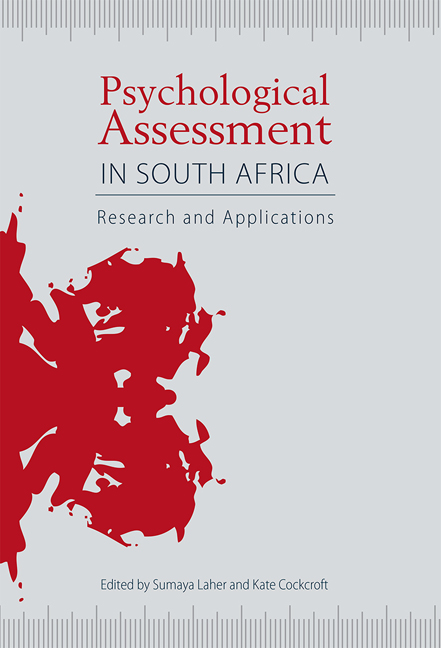Book contents
- Frontmatter
- Contents
- Tables and figures
- Acknowledgements
- Acronyms and abbreviations
- 1 Contextualising psychological assessment in South Africa
- Section One Cognitive tests: conceptual and practical applications
- Section Two Personality and projective tests: conceptual and practical applications
- Section Three Assessment approaches and methodologies
- 28 Ethical perspectives in assessment
- 29 Using computerised and internet-based testing in South Africa
- 30 The ImPACT neurocognitive screening test: a survey of South African research including current and projected applications
- 31 A family consultation model of child assessment
- 32 Qualitative career assessment in South Africa
- 33 Psychological assessment and workplace transformation in South Africa: a review of the research literature
- 34 Assessment of prior learning: a South African perspective
- 35 Large-scale assessment studies in South Africa: trends in reporting results to schools
- 36 Current and future trends in psychological assessment in South Africa: challenges and opportunities
- Contributors
- Index
28 - Ethical perspectives in assessment
from Section Three - Assessment approaches and methodologies
Published online by Cambridge University Press: 21 April 2018
- Frontmatter
- Contents
- Tables and figures
- Acknowledgements
- Acronyms and abbreviations
- 1 Contextualising psychological assessment in South Africa
- Section One Cognitive tests: conceptual and practical applications
- Section Two Personality and projective tests: conceptual and practical applications
- Section Three Assessment approaches and methodologies
- 28 Ethical perspectives in assessment
- 29 Using computerised and internet-based testing in South Africa
- 30 The ImPACT neurocognitive screening test: a survey of South African research including current and projected applications
- 31 A family consultation model of child assessment
- 32 Qualitative career assessment in South Africa
- 33 Psychological assessment and workplace transformation in South Africa: a review of the research literature
- 34 Assessment of prior learning: a South African perspective
- 35 Large-scale assessment studies in South Africa: trends in reporting results to schools
- 36 Current and future trends in psychological assessment in South Africa: challenges and opportunities
- Contributors
- Index
Summary
The etymological basis of the word ethics is the Greek word ethos, which, when it is translated into English, means a set of moral principles (Pharos, 2010). According to Leach and Oakland (2007), the first official document ever to express the need for imposing rules that would govern professional behaviour was the Code of Hammurabi (circa 1795–1750 BCE). Their research revealed that the Hippocratic Oath (circa 400 BCE) was the first known example of a professionally generated code of ethics. In 1958, the American Psychological Association (APA) established the first ethical code for psychologists (Leach & Oakland, 2007). Since then, many countries have developed ethical codes addressing issues associated with psychological practice and psychological assessment. South Africa is one of many countries that have produced an ethical code largely influenced by the 2002 APA code (Leach & Oakland, 2007). The South African code is published under the heading ‘Rules of Conduct Pertaining Specifically to Psychology’ by the Professional Board for Psychology, which falls under the auspices of the Health Professions Council of South Africa (HPCSA) (HPCSA, 2010a).
Louw (1997a) perceives the existence of a South African code as evidence of the intention of local psychologists to adhere to professional standards of practice. He notes that such a code is a defining characteristic of the discipline and serves as proof that psychology in South Africa deserves its scientific status. Since the Professional Board for Psychology falls under the auspices of the HPCSA, clients are legally protected against any possible harm and control is exerted over the conduct of assessment practitioners. Despite an ongoing debate over the feasibility of these institutions in South Africa (AfricaRights, 2007a; 2007b), it should be noted that international commentators advocate the existence of statutory control no matter what the type or form (Hall, Howerton & Bolin, 2005; ITC, 2001; Leach & Oakland, 2007).
In South Africa there are various forms of legislation that contribute to psychological assessment in some form.
- Type
- Chapter
- Information
- Psychological Assessment in South AfricaResearch and Applications, pp. 409 - 423Publisher: Wits University PressPrint publication year: 2013



